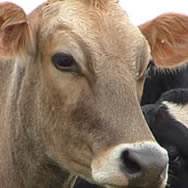
 |
Cloned animals safe to eat: FDADecember 30th, 2006Washington, D.C. - Cloned cattle, pigs and goats is "likely to be as safe as" food from their non-cloned counterparts, according to a government draft proposal. 
The 800-page draft, released yesterday, arrives more than five years after the US Food and Drug Administration (FDA) requested a voluntary moratorium on the use of cloned animals or their offspring for food until their safety could be assessed. The proposal is now open to a 90-day public comment period, after which the FDA is widely expected to officially approve food from some cloned animals for human consumption (for sheep, they say, there is still not enough data); the draft states that the FDA has few concerns about the health of cloned animals or the food that they produce. Industry has been awaiting these findings for years. The FDA released a summary proposal in 2003, but the administration took three more years to produce a full document, citing a lack of sufficient scientific evidence. Since then, the FDA has been gathering data from peer-reviewed studies and unpublished reports from commercial cloning companies. The results of that effort are published in the January 2007 edition of Theriogenology, now available online. FDA approval is unlikely to unleash a flood of food from cloned animals - cloning is still too expensive to be used regularly for food production. Instead, the technique will initially be used primarily to clone elite animals for breeding. The offspring of those clones will probably be the first to arrive at the dinner table, although a few clones may wend their way directly into the food supply when they are no longer useful for breeding. Clones without borders The impact of the FDA's decision will be felt beyond US borders. Chikara Kubota, an animal-cloning researcher at Kagoshima University in Japan, says he was relieved to hear of the FDA's decision and he expects the announcement to affect the status of moratoriums in other countries, including Japan. Mal Brandon, chairman of Clone International, an animal cloning company based in Australia and New Zealand, says the FDA's announcement is "fantastic news". "It means we can officially open for business," says Brandon, "and draw up contracts with animal breeders and livestock owners worldwide, confident that the offspring of cloned livestock can enter the food chain." But not everyone is enthusiastic about allowing cloned animals into the food supply. A 2006 survey conducted by the Pew Initiative on Food and Biotechnology found that 64% of Americans are uncomfortable with the notion of animal cloning, raising concerns that allowing products from such animals into the food supply could hurt US dairy and meat industries. The International Dairy Foods Association, an organization of US dairy lobbyists, issued a response to the FDA's draft proposal, calling cloning a "niche-market technology" that offers no current consumer benefit. Concerns about the US meat and dairy industry have also worked their way to the US Congress. In an 11 December letter to the US Department of Health and Human Services, Senator Patrick Leahy of Vermont - a state that has a large dairy industry - and six other senators urged caution and cited concerns about consumer acceptance of products from cloned animals. "Clearly, consumers are not clamouring for this new food technology," the senators wrote. Nature |
|